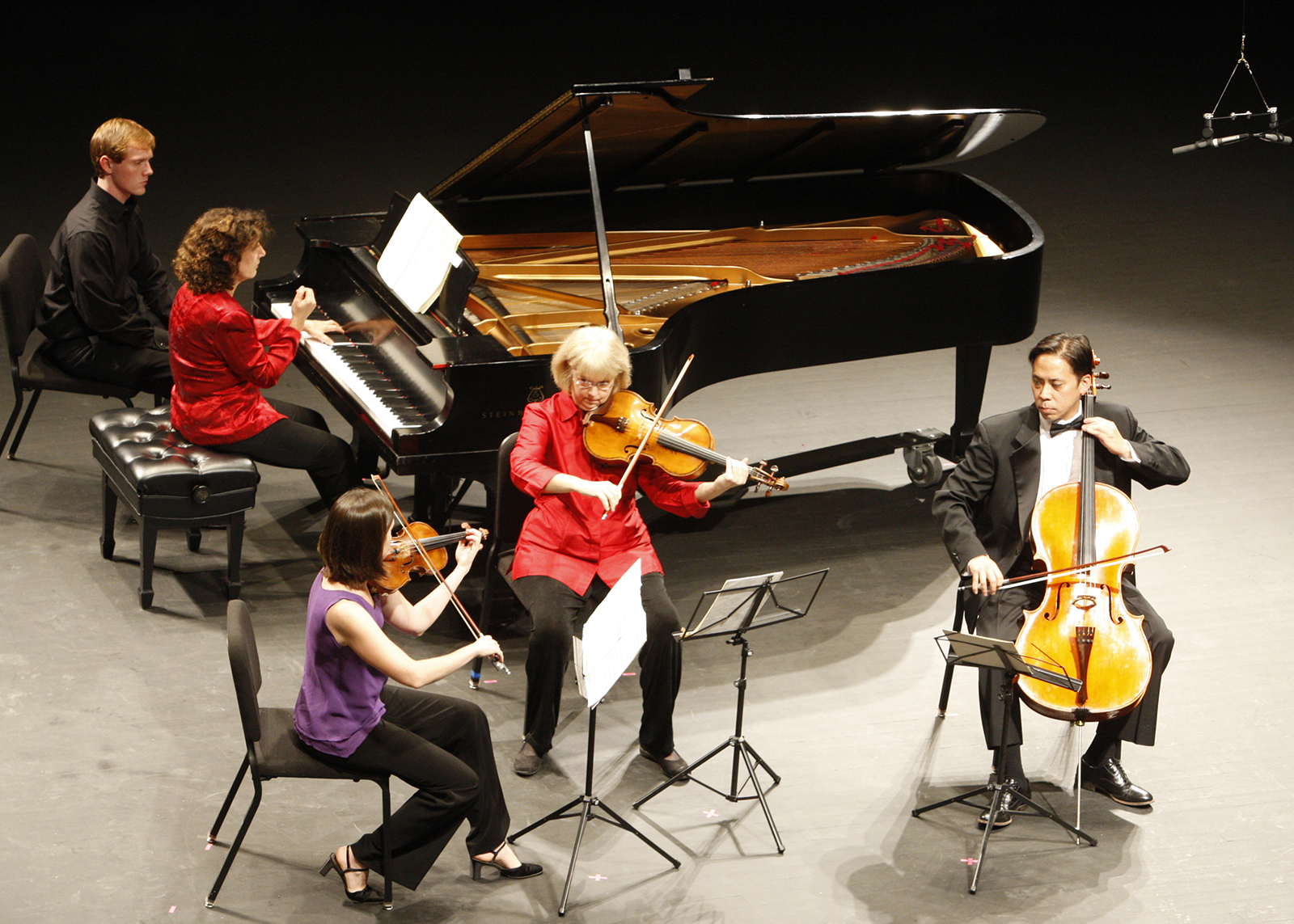by Bonnie Arant Ertelt
The year 1974 brought a raft of cultural milestones to Nashville: Ike and Tina Turner performed at Municipal Auditorium in February, and Porter Wagoner and Dolly Parton broke up their musical partnership the same month. President Richard Nixon played piano during the dedication ceremony of the new Grand Ole Opry House in March, only weeks after the Watergate Seven were indicted. Former Beatle Paul McCartney with his wife, Linda, and their kids spent the summer visiting Music City while living in a local songwriter’s home. And Robert Altman filmed on location in and around town for his movie Nashville, which would open to great acclaim the next year.
That fall, Blair Academy, Nashville’s center for classical chamber music, made a new hire. Kathryn Plummer, a 26-year-old violist originally from Lexington, Kentucky, joined the Blair String Quartet. A student of David Dawson at Indiana University’s Jacob’s School of Music and Walter Trampler at the Juilliard School, she took a pay cut to come to Blair from her full-time tenured position with the Cincinnati Symphony as assistant principal violist.
She recalls that one day during an orchestra rehearsal, a white slip of paper with her name on it was handed from person to person, through the violin section to the viola section. “That’s how old I am,” she laughs. “A paper note, an ancient form of communication. I opened it, and it said, ‘Call Chris Teal.’”
Christian Teal, professor emeritus of violin, Blair’s first holder of the Joseph Joachim Chair in Violin and first violin in the Blair String Quartet from 1972 to 2014, had played with Plummer at Indiana. He called Dawson, her former teacher, to track her down and invite her to audition.
“Chris told me about all the hopes and dreams in the future of Blair Academy [the name of the Blair School of Music before the merger of Vanderbilt and Peabody in 1979 and now the name of Blair’s precollege program]. I sent in a tape, and they invited me to audition live,” Plummer said. “As I flew back to Cincinnati, I kept saying to myself, ‘I’ve got to get this job. I want it more than anything I’ve ever wanted.’”
LISTEN to the Blair String Quartet perform Haydn’s Quartet in D minor, Op. 76, No. 2, Allegro from a recital, Dec. 1, 1974, in Peabody’s Human Development Laboratory Auditorium. If you have a VUnet ID, you can hear the full recital. (Courtesy of the Wilson Music Library, Blair Performance Archive)
The Blair String Quartet, 1974–1987
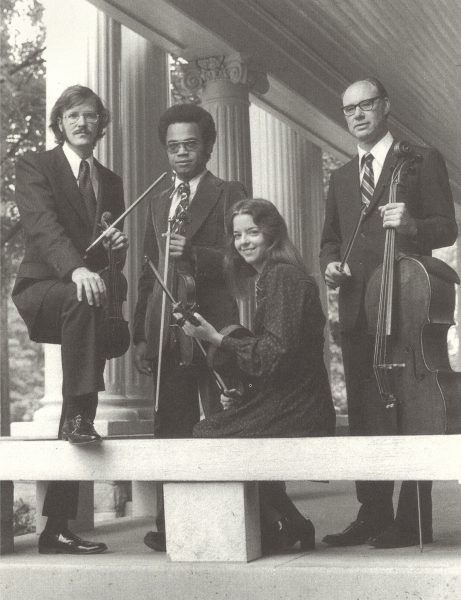
That summer, after landing the viola position with the BSQ, and before Plummer had moved to Nashville, she met William Fitzpatrick at the Aspen Music Festival. Fitzpatrick had studied at Blair as a precollege student.
“He said, ‘I’m going to be second violin in the Blair String Quartet,’ and we were just amazed that we met by accident,” Plummer said. “We ended up getting apartments in the same house on Belmont Boulevard. He only stayed one year at Blair—not 50—but we’ve stayed close friends.”
“I remember her kindness in allowing me to stay in the apartment in the back of her house during the year I spent in Nashville while a member of the Blair Quartet,” said Fitzpatrick, who retired in 2022 as the Henri Temianka Professor of Music and director of string studies at Chapman University’s Hall-Musco Conservatory of Music in Orange, California. “It’s rare to meet and work with a musician of such a high caliber who is so giving and willing to share. This is what I remember most of all about Kathy.”
Playing with the Blair String Quartet from the late 1970s to the mid-1980s was exciting for Plummer. In 1978, the quartet debuted at Weill Recital Hall at Carnegie Hall.
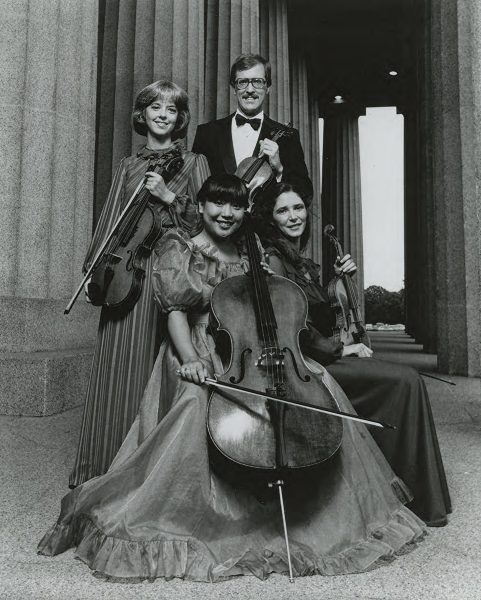
“Playing in New York at Weill and being reviewed by The New York Times was such a big moment,” Plummer said. “We also recorded a fair amount during those days. I had done session playing in Nashville, but to record an actual string quartet album—and we did several of them! We also played at the National Gallery of Art in Washington, D.C., and toured throughout the Southeast. Chris spearheaded so much of that, and it was such fun traveling and working together. Those were exciting years for me.”
“Kathryn was one of the major reasons I was drawn to apply for the Blair String Quartet position at Blair,” said Cornelia Heard, Valere Blair Potter Professor of Violin. “I looked up to her when she was principal viola in the Aspen Chamber Symphony, and I was thrilled to get the opportunity to play with her. We quickly formed a friendship that has grown steadily over the years. Her beautiful tone, excellent rhythm and deep love, understanding and respect for music were foundational in the quartet and have always been an inspiration.”
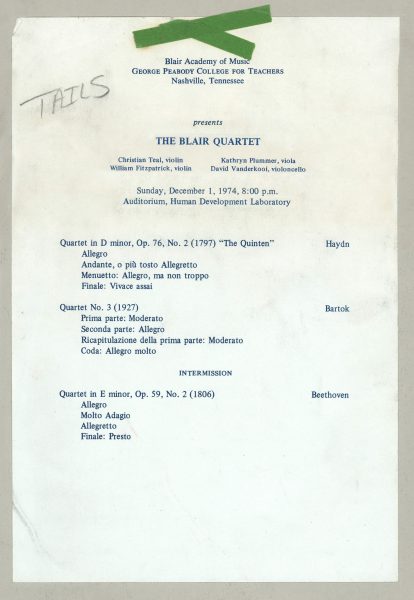
After the merger with Vanderbilt ended the music department at Peabody in 1979, and the university pledged a new building for the Blair School of Music on Blakemore Avenue, the expansion from a precollege academy to include an undergraduate curriculum and major in music meant opportunities for teaching and performing also increased.
“At Blair, there was the excitement and enthusiasm of starting something new,” Plummer said. “We all had hopes and aspirations that we wanted for the school and for the groups that taught there. We had great dreams, and it was fun to build something and see it start to develop.
“That camaraderie is still [at Blair]. We’re much bigger, but the new faculty I have met all have that vision that we had when we were young: to make the school better. There are a lot of great schools of music, but I think Blair has retained its special collaborative spirit. I hope that that will always remain when I’m gone.”
LISTEN to Kathryn Plummer and Evelyn Grau, violas, perform Wilhelm Friedemann Bach’s Duo in G Major, No. 1, Presto from a recital given Oct. 11, 1975, in Peabody’s Human Development Laboratory Auditorium. (Courtesy of the Wilson Music Library, Blair Performance Archive)
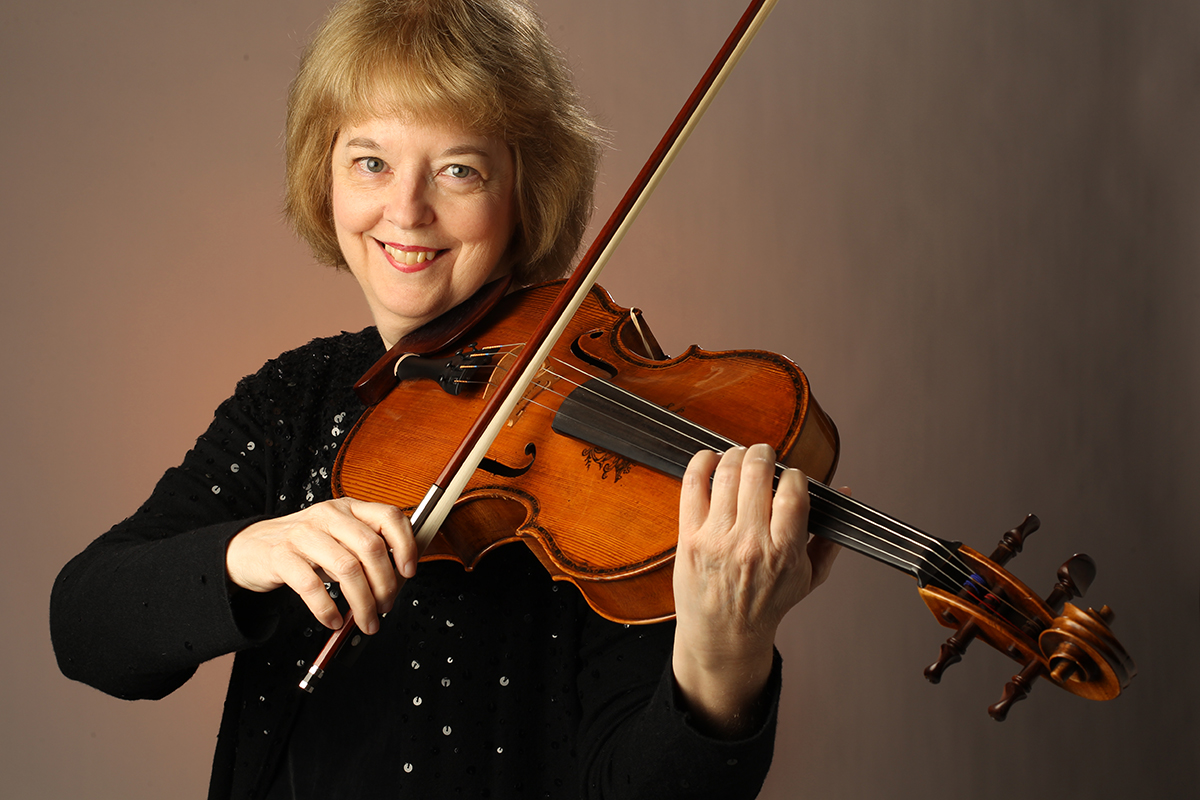
Learning to teach
While it may have been chamber music that drew Plummer to Blair, she was excited about the chance to teach, something she had never done before. The phrasing, shading and timing used in playing chamber music is applicable to how students learn one-on-one with private teachers. Teaching chamber music allows students to learn how to read music emotionally as well as technically within a small group to gain common insight about how to play as an ensemble.
“I learned how to teach on the spot, and Chris [Teal] was a great mentor. I learned so much from him and David Vanderkooi [original cellist with the Blair String Quartet and Blair faculty member, 1967–84]; they took me under their wing.”
Plummer also credits her elementary school music teacher, Joseph Pival, with her teaching philosophy. As a fourth-grade student, being able to play the flutophone by ear got her into trouble when it came time to pass the sightreading examination and gain entry into an elementary music ensemble. She hadn’t bothered to learn it.
“Technically, I wasn’t supposed to be allowed to pick a stringed instrument or a band instrument,” Plummer said. “But—bless his heart—Mr. Pival called my parents and said, ‘I’m going to make an exception, because I see that she has talent, so I’m going to pass her.’
“I think that decision impacts the way I teach,” she said. “I look at every student as a unique, wonderful individual with their own strengths and maybe some challenges. I try to customize all my teaching to that particular person at that particular time. I think that’s what Mr. Pival was doing with me.”
Christopher Lowry, BMus’11, is one of Plummer’s many successful students. Lowry recently won the American Viola Society’s 2024 biennial Maurice Gardner Competition for Composers with his work, Zenith (for Jackson) for viola and electronics. Lowry holds a doctorate in musical arts in viola performance from Louisiana State University and is principal violist for the Alabama Symphony Orchestra.
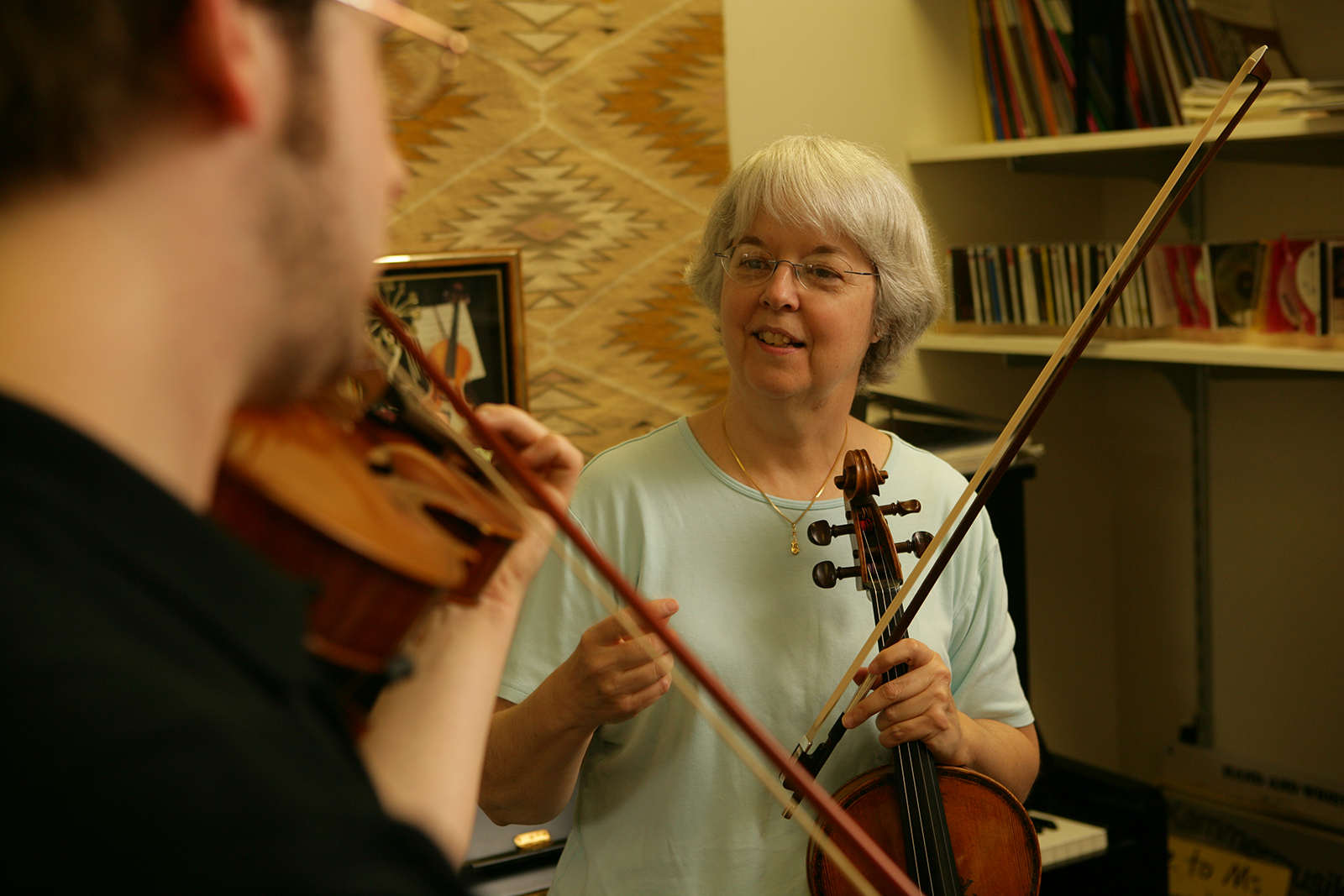
“I look at every student as a unique, wonderful individual with their own strengths and maybe some challenges. I try to customize all my teaching to that particular person at that particular time.” —Kathryn Plummer
“Kathryn was an amazing mentor and always a fierce advocate for me and all her students,” Lowry said. “She maintained a healthy balance between the technical and musical in her teaching, and she was always incredibly nurturing and patient in her approach, though unwavering in her high standards!”
Her former colleagues, Pam Schneller, emerita senior lecturer in choral music and former associate dean, and Roland Schneller, emeritus adjunct senior artist teacher of piano, agree about her teaching excellence. “Roland and I were privileged to be Kathryn’s colleagues for more than 30 years,” Pam Schneller said. “She’s an exceptional teacher at every level. Her high standards, dedication to the science of healthy technique and steadfast belief in her students inspired them to reach unimagined heights. Her students play in major orchestras all over the world.
“What I remember most, however, is her kindness and collegial attitude with everyone she meets,” she added—a point that Lowry also emphasizes.
“One of my favorite aspects of studying with her is that she always made lessons a safe space for everyone,” he said. “No matter how unprepared you might be for your lesson, she would never make you feel less than anyone else and was always there to help you through whatever you were going through—musically or otherwise. She has continued to be a great colleague and friend.”
WATCH: Monk’s Oboe, Libby Larsen, composer, performed by Jared Hauser, oboe; Carolyn Huebl, violin; Cornelia Heard, violin; Kathryn Plummer, viola; Felix Wang, cello, in Turner Recital Hall, Blair School of Music, 2023
Once more on the Turner stage
On May 4, at 3 p.m., many former students, colleagues and family members will gather for a retirement concert in Plummer’s honor on the stage at Turner Hall. Plummer has handpicked the music and is playing on every piece, including Arboretum, a work for four violas, written by Lowry. He will play it with Plummer, Molly Sharp, BMus’90 and principal viola with the Richmond Symphony Orchestra, and Alison Wang, Class of 2024 major in viola performance and medicine, health and society. The piece is a tribute to Plummer and uses the metaphor of a tree, like those on campus in Vanderbilt’s arboretum, to symbolize her impact at Blair, as one who has taught for five decades, withstood challenges and propagated a legacy of successful students.
“Chris [Lowry] will be the storyteller playing the first part, I’m the professor playing the second part. Molly Sharp, who was a Founder’s Medalist, by the way, is playing third, and fourth will be Alison Wang, who is going to Juilliard for her master’s,” Plummer said with pride. “I’m so touched.”
“That camaraderie is still [at Blair]. We’re much bigger, but the new faculty I have met all have that vision that we had when we were young, to make the school better. There are a lot of great schools of music, but I think Blair has retained its special collaborative spirit. I hope that that will always remain when I’m gone.” —Kathryn Plummer
Plummer’s half-century journey at Blair began and will end with chamber music, but it’s the students she says she will miss most. “I don’t think students realize how much we learn from them,” she said. “As players, I see where they’ve come from and what they’ve learned from their precollege teachers, and I’m like, ‘Wow, I’ve never seen that before.’ It’s an amazing accumulation of knowledge.”
Plummer’s retirement plans include writing a memoir for her family and spending time with her two children and four grandchildren. But she will never stop playing the viola.
“When you play music, you make new discoveries every day about the music, culture and yourself. You know how to better play the instrument, how to improve, and that’s what keeps me going. I’ll keep playing and maybe do some teaching on the side. I am still learning. I am still a student, even at 76.”
